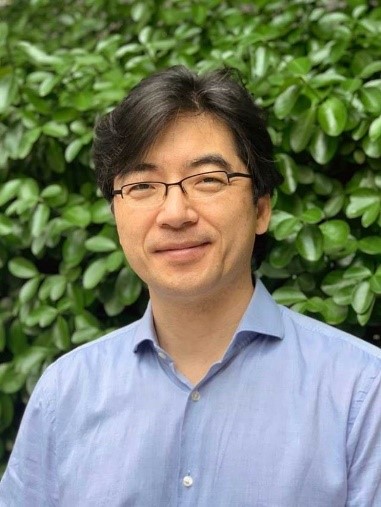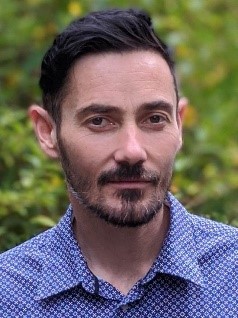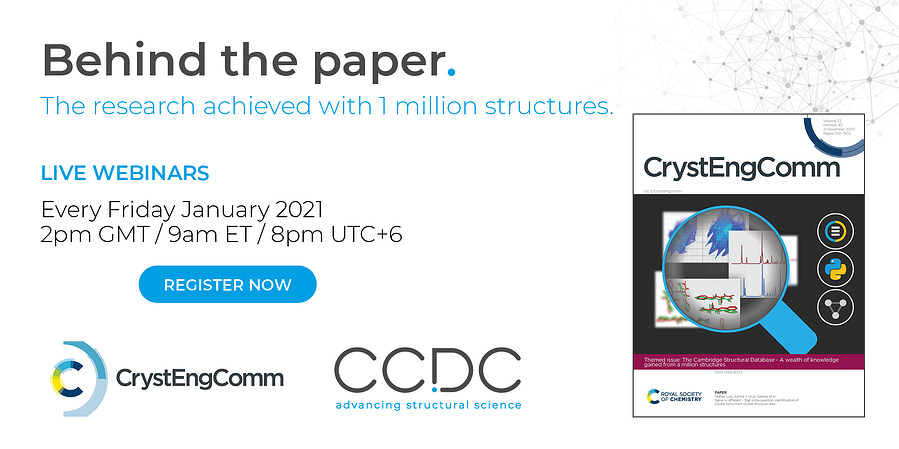Well what a year this has been! CrystEngComm has published over 850 articles, from 57 countries with two themed issues and an increase on review content from 2019!
As we all know with 2020 came the emergence of Covid-19 all around the world. The virus has no doubt had an impact on all of our individual lives as well as to our research community in some form or other, and all of us here very much hope that you all continue to stay safe and well. If as a member of our community you do need support through Covid-19 there is further information available here.
We have all moved forward and adapted our lives and ways of working as best we can to enable us to positively continue what we do. Chair of the CrystEngComm Editorial Board Professor Pierangelo Metrangolo has this to say about how Covid-19 initially affected him and his research team and what he thinks the community has and can take from this experience:
| “The COVID-19 pandemic has affected everyone’s daily and professional lives for many months and perhaps there are more yet to come. I remember I was shocked during the first wave when we suddenly had to stop all of our activities. But within a few days, I realized that I had to react and started to serve my local community helping my department to produce hand-sanitizing liquid for hospitals, the Red Cross, police officers, and prisons in Lombardy. In the end we produced and distributed more than 100000 litres of the liquid. I remember the hours spent on the phone contacting business associates and acquaintances creating a network of manufacturers that could help supply the ingredients and distribute the product. Obviously, my research activity slowed down and it wasn’t easy to stay connected with the students and staff of my research group.
By the beginning of June, we resumed in-person research activities and started our “new normal” life finding ways to adapt and to connect online. There was little contact with other people, staying closed in the office, not much social or recreational activity, no trips and no conferences. On the other hand, I discovered that virtual platforms also offered new opportunities. For example, I started a series of virtual seminars at my department inviting colleagues from all over the world. Also, the 4th International Symposium on Halogen Bonding was held virtually in November and it was a great success. Although through a monitor, I realized how happy I was meeting with the familiar faces of friends and colleagues from the most remote places in the world, and seeing that they were in good health and we could discuss science while sipping a cup of coffee in the peace of our office or at home. This pandemic will hopefully be over soon thanks to a vaccine. But we shall never forget the lessons learned in these difficult times. We as scientists have a great responsibility towards society, and chemistry, in particular, has fully demonstrated its role. The way we teach, carry out research and interact with colleagues perhaps will be impacted forever, but I really hope that we will keep the sense of solidarity, community, and global intent of preserving life and behave more responsibly for the benefit of humankind and our planet.”
Professor Pierangelo Metrangolo, Politecnico di Milano, Italy CrystEngComm Editorial Board Chair |
2020 also saw two new Associate Editors join the CrystEngComm Editorial Board, Professors Christian Doonan and Kwangyeol Lee. We were delighted to be able to welcome them to the team and are looking forward to working with them to continue to shape the future of the journal for the community. We also said goodbye to Professor Georg Garnweitner as an Associate Editor, and we thank him for his many years working so hard to help make the journal what it is today.
CrystEngComm commissioned themed issues in 2020
Two commissioned themed issues of the journal were published in 2020:
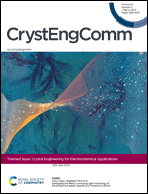 |
Crystal engineering for electrochemical applications – this issue focuses on crystal engineering strategies for the design of materials with superior properties for electrochemical applications, ranging from lithium-ion batteries and supercapacitors to electrocatalysts. It was guest edited by Professor Georg Garnweitner,TU Braunschweig and Professor Dongfeng Xue, Chinese Academy of Sciences. |
| The Cambridge Structural Database – A wealth of knowledge gained from a million structures – This issue combines 33 articles which highlight some of the many applications of the CSD in celebration of the one millionth crystal structure, a significant community achievement in 2019. Throughout this issue, the research carried out by the authors demonstrates the breadth of information and the variety of applications arising from the data in the CSD. Over the last half a century the complexity and size of structures have expanded, and the techniques and instrumentation used to determine new structures have evolved considerably. The articles show how far the field has evolved. It was guest edited by Suzanna C. Ward and Ghazala Sadiq, CCDC. | 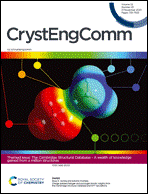 |
CrystEngComm Live Webinars in 2021
Join CCDC and CrystEngComm for 1 hour every Friday in January, where we’ll be going Behind the paper with an author who used insights from the 1 million structures in the CSD in a unique way.
In these sessions you will get to know the author, hear their views on the wider context and challenges of their work – and have the chance to ask questions.
CrystEngComm Editor’s Collections, 2020
In late 2019 we started publishing Editor’s collections in CrystEngComm, and have continued this throughout 2020. Curated by Editorial Board members, these collections highlight a number of previously published articles from the journal which the Guest editor has personally chosen to showcase a specific area of research. The Editor’s collections published in 2020 are:
Editor’s Collection: Mechanochemistry, Guest editor Elena Boldyreva, Novosibirsk State University, Russia
Editor’s Collection: Computer aided solid form design, Guest Editor Susan Reutzel-Edens, Eli Lilly and Company, USA
Editor’s Collection: Zirconium based MOFs for catalysis, Guest Editor Professor Omar Farha, Northwestern University, USA
Editor’s collection: Metal Organic Frameworks as catalysts for water splitting and CO2 reduction, Guest Editor Tong-Bu Lu, Tianjin University of Technology, China
Accessing 2020 Content of Interest
We have made it easier for readers to access recently published content of interest to them this year by curating subject collections, Highlight article collections and HOT article collections:
Crystal engineering techniques
Publishing Open Access in CrystEngComm – Read & Publish
Open access (OA) is shaping the future of scholarly publishing, and we are doing all we can to build an open future that works for everyone. This includes developing services that will help you – whether you’re the one publishing, the one reading, or the one managing the entire process – to make important research more easily available.
Read & Publish is an alternative to the traditional subscription model. It helps both authors and institutions gradually tip the balance of their publishing output towards open access, making the process easier and more financially viable. With a Read & Publish agreement in place at their institution, authors can publish gold OA in all hybrid Royal Society of Chemistry journals, and readers have access to every paper in our journal portfolio.
More information on Read & Publish is available here.
We would love you to be part of the exciting future of CrystEngComm so on behalf of the Chair of the Editorial Board, Professor Pierangelo Metrangolo, Politecnico di Milano, Italy, we invite you to submit your research to CrystEngComm.
From all the CrystEngComm team, we thank you for your continued interest in and support of the journal and wish you a Happy New Year!


